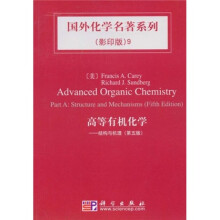Preface
Acknowledgment and Personal Statement
Introduction
Chapter 1 Chemical Bonding and Molecular Structure
Introduction
1.1 Description of Molecular Structure Using Valence Bond Concepts
1.1.1 Hybridization
1.1.2 The Origin of Electron-Electron Repulsion
1.1.3 Electronegativity and Polarity
1.1.4 Electronegativity Equalization
1.1.5 Differential Electronegativity of Carbon Atoms
1.1.6 Polarizability, Hardness, and Softness
1.1.7 Resonance and Conjugation
1.1.8 Hyperconjugation
1.1.9 Covalent and van der Waals Radii of Atoms
1.2 Molecular Orbital Theory and Methods
1.2.1 The Hiickel MO Method
1.2.2 Semiempirical MO Methods
1.2.3 Ab Initio Methods
1.2.4 Pictorial Representation of MOs for Molecules
1.2.5 Qualitative Application of MO Theory to Reactivity: Perturbational MO Theory and Frontier Orbitals
1.2.6 Numerical Application of MO Theory
1.3 Electron Density Functionals
1.4 Representation of Electron Density Distribution
1.4.1 Mulliken Population Analysis
1.4.2 Natural Bond Orbitals and Natural Population Analysis
1.4.3 Atoms in Molecules
1.4.4 Comparison and Interpretation of Atomic Charge Calculations
1.4.5 Electrostatic Potential Surfaces
1.4.6 Relationships between Electron Density and Bond Order
Topic 1.1 The Origin of the Rotational (Torsional) Barrier in Ethane and Other Small Molecules
Topic 1.2 Heteroatom Hyperconjugation (Anomeric Effect) in Acyclic Molecules
Topic 1.3 Bonding in Cyclopropane and Other Small Ring Compounds
Topic 1.4 Representation of Electron Density by the Laplacian Function
Topic 1.5 Application of Density Functional Theory to Chemical Properties and Reactivity
T 1.5.1 DFT Formulation of Chemical Potential, Electronegativity, Hardness and Softness,and Covalent and van der Waal Radii
T 1.5.2 DFT Formulation of Reactivity——The Fukui Function ..
T 1.5.3 DFT Concepts of Substituent Groups Effects
General References
Problems
Chapter 2 Stereoehemistry, Conformation, and Stereoselectivity.. "
Introduction
2.1 Configuration
2.1.1 Configuration at Double Bonds
2.1.2 Configuration of Cyclic Compounds
2.1.3 Configuration at Tetrahedral Atoms
2.1.4 Molecules with Multiple Stereogenic Centers
2.1.5 Other Types of Stereogenic Centers
2.1.6 The Relationship between Chirality and Symmetry
2.1.7 Configuration at Prochiral Centers
2.1.8 Resolution——The Separation of Enantiomers
2.2 Conformation
2.2.1 Conformation of Acyclic Compounds
2.2.2 Conformations of Cyclohexane Derivatives
2.2.3 Conformations of Carbocyclic Rings of Other Sizes
2.3 Molecular Mechanics
2.4 Stereoselective and Stereospecific Reactions
2.4.1 Examples of Stereoselective Reactions
2.4.2 Examples of Stereospecific Reactions
2.5 Enantioselective Reactions
2.5.1 Enantioselective Hydrogenation
2.5.2 Enantioselective Reduction of Ketones
2.5.3 Enantioselective Epoxidation of Allylic Alcohols
2.5.4 Enantioselective Dihydroxylation of Alkenes
2.6 Double Stereodifferentiation: Reinforcing and Competing Stereoselectivity
Chapter 3 Strucral Effects on Stability and Reactivity
Chapter 4 Nucleophilic Substitution
Chapter 5 Polar Addition and Elimination Reactions
Chapter 6 Carbanions and Other Carbon Nucleophiles
Chapter 7 Addition,Condensation and Substitution Reactions of Carbonyl Compounds
Chapter 8 Aromatictity
Chapter 9 Aromatic Substitution
Chapter 10 Concerted Pericyclic Reactions
Chapter 11 Free Radical Reactions
Chapter 12 Photochemistry
References to Problems
Index









 缺书网
缺书网 扫码进群
扫码进群